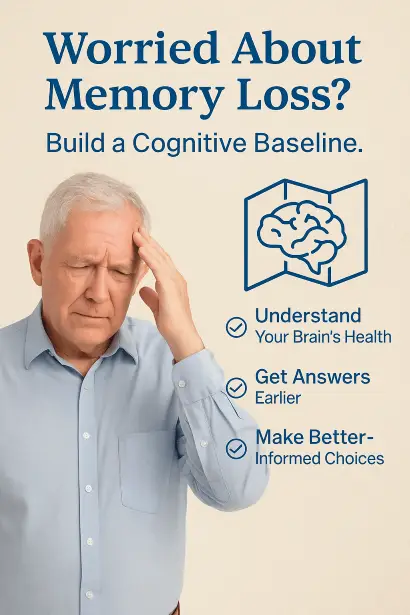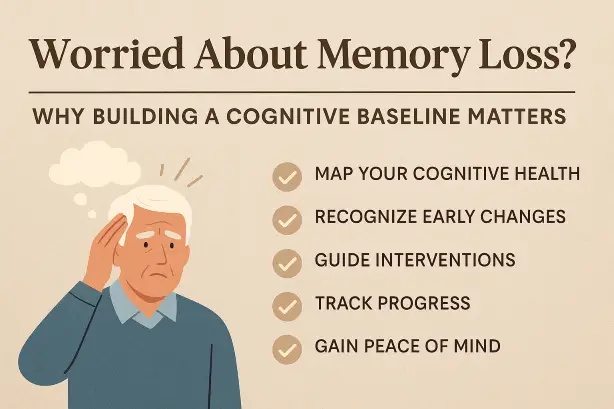The Call That Inspired This Article
Last week, a 66-year-old man called us. His voice carried quiet worry. Both his parents had dementia.
He’s been forgetting names. He struggles with learning new things, like using his computer. He asked, almost whispering:
“Is this just aging… or something more?”
He’s not alone. Every week, people just like him reach out—concerned, uncertain, and hoping for clarity.
Your Brain’s Roadmap: Why a Cognitive Baseline Matters
A neuropsychological cognitive evaluation is like creating a map of your brain today. Without that map, it’s impossible to see where you’ve been, or where you’re heading.
By measuring memory, attention, processing speed, language, and problem-solving, we create a baseline of your cognitive health.
With this baseline, you gain more than data:
You gain peace of mind
You get answers earlier
You make better-informed choices about your care
Why Repeating Evaluations Is So Important
One evaluation gives you insight. Repeating evaluations tells your story.
Just like an annual physical, one test provides information, but tracking results over time reveals patterns and early changes.
Benefits of repeated evaluations:
Early detection — Subtle declines are caught sooner, improving treatment outcomes.
Peace of mind — Many patients learn their memory lapses are normal for their age.
Planning ahead — Tracking over time helps guide personalized treatment decisions.

A Story of Early Action
One of our patients worried about forgetting appointments. Her baseline results looked fine. A year later, a follow-up test revealed slight changes. Because we caught it early, we started treatment sooner—and she regained control and confidence in her daily life.
What a Neuropsychological Cognitive Evaluation Measures
Our evaluations are comprehensive but explained simply:
Memory — learning, recalling, and retaining information
Attention & Focus — staying on task without distraction
Processing Speed — how quickly your mind works
Problem-Solving — reasoning and adapting to challenges
Language Skills — understanding, naming, and expressing thoughts
Sometimes results bring reassurance. Other times, they identify areas to improve. Either way, the process gives you clarity and a plan forward.
Meet Our Experts in Cognitive Health
At Dr. Iospa Psychiatry Consulting Group, your evaluation is handled by a collaborative team. Each specialist contributes unique expertise to ensure accurate diagnosis and compassionate care.
Dr. Alla Iospa, MD, DABPN (Adult & Geriatric Psychiatrist)
Dr. Iospa is an adult and geriatric psychiatrist with decades of experience diagnosing and treating conditions involving memory loss, cognitive decline, anxiety, and depression.
She served as Associate Director at the Pearl I. Barlow Center for Memory Evaluation & Treatment at the Silberstein Alzheimer’s Institute, NYU Langone Health, where she helped develop advanced care strategies for patients with dementia and age-related cognitive conditions.
Dr. Iospa leads treatment planning, coordinating neuropsychological assessments with her team to ensure each patient receives comprehensive care tailored to their needs.
Dr. Dana Haywood, Ph.D. (Clinical Neuropsychologist)
Dr. Haywood is a highly skilled neuropsychologist with advanced training, including a postdoctoral fellowship at Columbia University Medical Center.
At Columbia, she gained extensive expertise in evaluating complex neurodevelopmental and cognitive disorders. She further advanced her clinical and research experience at the Friedman Brain Institute at the Icahn School of Medicine at Mount Sinai, where she contributed to cutting-edge techniques in neuropsychological assessment and cognitive remediation therapy.
Her work focuses on using evidence-based tools to deliver precise diagnoses and personalized treatment plans for patients of all ages.
Dr. William Lu, Psy.D. (Clinical Neuropsychologist)
Dr. Lu is a senior neuropsychologist with extensive experience in brain injury recovery, memory disorders, and cognitive rehabilitation.
He completed a postdoctoral fellowship in Clinical Neuropsychology and Rehabilitation Research at the Icahn School of Medicine at Mount Sinai, where his work focused on cognitive outcomes, sleep disturbances, and recovery after traumatic brain injuries.
Today, Dr. Lu serves as a Senior Psychologist and Faculty Clinical Instructor at Rusk Rehabilitation, NYU Langone Medical Center, combining clinical expertise, academic teaching, and advanced research to provide comprehensive care.
Individual Cognitive Remediation Therapy: Strengthening Your Brain
If testing identifies areas of concern, we may recommend Cognitive Remediation Therapy (CRT)—a personalized, evidence-based treatment that helps improve memory, focus, and problem-solving skills.
Think of CRT like physical therapy for your brain. With structured training, patients can strengthen cognitive pathways and build resilience against decline.
Disclaimer:
The information provided in this guide is for educational purposes only and should not be considered a substitute for professional medical advice, diagnosis, or treatment. Consult with your psychiatrist regarding any specific medication management concerns or questions you may have. Each individual’s situation is unique, and your doctor can provide personalized recommendations based on a comprehensive evaluation of your medical history, symptoms, and needs. Always follow the guidance and instructions provided by your psychiatrist regarding medication management.

